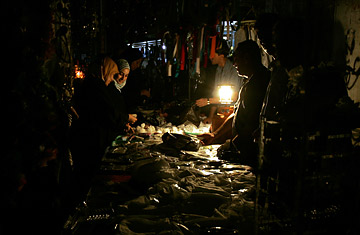
Palestinian women shop in a market lit by a gas lamp.
The residents of Sderot, an Israeli town on rolling hills near the Negev desert, are more accustomed to rockets falling from the skies than to rain. Hardly a day passes without a homemade rocket or two fired by Palestinian militants streaking crazily across the sky from Gaza and into Sderot. This week, Israeli Defense Minister Ehud Barak decided to try a new method to end these rocket attacks: A directive issued Thursday announced that every time that militants fire a rocket, Israel would respond by cutting off electricity to Gaza's 1.5 million people. Barak's move was based on the assumption that the prospect of bringing new collective hardship upon their own, long-suffering people would restrain Palestinian militants from attacking Israeli communities.
Just one day after Barak's decree, Islamic Jihad was at it again. Three rockets crashed into the Negev desert, and on Friday a fourth landed near Sderot. But Gazans have reacted to the blackout threat with a collective shrug. "What do we care if there's no power?" said one Gaza journalist reached by phone. "We hardly have anything to cook, anyway."
The United Nations and other international bodies, however, joined Palestinians in denouncing the new measures as collective punishment of the residents of an enclave closed off by the Israeli military. Even before the latest crackdown, Gaza's residents have endured restrictions of travel and shortages of food and supplies imposed by the Israelis, backed by Western nations, after Hamas seized control of the area last June from the rival Fatah militia of President Mahmoud Abbas.
The punitive blackouts are only one part of the new clampdown on Gaza. Food imports from Israel, the only source for Gaza residents, are also being scaled down from 120 trucks a day to 70, officials say. Military officials said that Barak's other choice was a full-scale assault on Gaza, but he rejected this option since it would cost many lives on both sides.
One Hamas military commander told TIME that his organization could stop Islamic Jihad, a far smaller group, from launching the rockets. "But why should we?" he said. "We offered the Israelis a truce, based on accepting a Palestinian state within the 1967 borders, and they rejected that." Another Hamas official, Salah Bardweel, head of the parliamentary bloc, said that the new sanctions won't weaken Hamas's control in Gaza. "We have money, our morale is high, and this only makes Palestinians angrier at Israel."
The Israeli threat sharpens the dilemma facing President Abbas: Even as he negotiates with Israel in preparation for a U.S.-sponsored peace summit to be held in Annapolis later this year, he is locked into a power struggle with Hamas throughout the Palestinian territories. Still, his government on Thursday condemned the new Israeli crackdown. Abbas's advisers say that collective punishment of Gazans will make it harder, if not impossible, for the President to reach accord with Israel.
The legality of Israel's proposed power cuts is also contested. Government lawyers argue that because Israel pulled its troops and settlers out of the 40-mile-long coastal strip in 2005, it is no longer responsible for the welfare of its residents and can cut off electricity and fuel if it wants. "Because this is an entity that is hostile to us, there is no reason for us to supply them with electricity beyond the minimum required to prevent a crisis," Deputy Defense Minister Matan Vilnai declared on an Israeli army radio station.
But the U.N. and other international organizations, and even some Israeli human rights lawyers, point out that Israel still maintains the control of an occupying power over Gaza, which gives it responsibility for the welfare of its impoverished but defiant residents. Despite the legal questions, no court challenges have been mounted in Israel thus far.
Meanwhile, Sderot's residents assume that even if Gaza is blanketed in darkness, Palestinian rockets will still light up the sky en route toward their homes.
—With reporting by Jamil Hamad/Bethlehem
